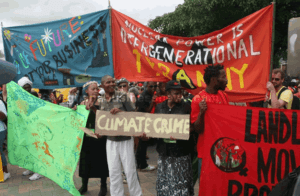World is at tipping edge of succumbing to global warming – Experts
 Dr Kwesi Appeaning-Addo, Head of the Marine and Fisheries Department, University of Ghana, Legon, has said the world is at a critical moment and almost at the tipping edge of succumbing to global warming.
Dr Kwesi Appeaning-Addo, Head of the Marine and Fisheries Department, University of Ghana, Legon, has said the world is at a critical moment and almost at the tipping edge of succumbing to global warming.
He said the country’s situation is not far-fetched from the global simulation figures and called for prompt action at all levels.
Dr Appeaning-Addo was speaking to the Ghana News Agency on what could happen to the planet and its population with global warming of 1.5°Celsius (or 2.7 degrees Fahrenheit) as outdoored by the IPCC, or Intergovernmental Panel on Climate Change from Incheon, Republic of Korea, this week.
He said “I have read portions of the report and it’s spot on. We are in almost at the tipping edge.”
“The time to act as a nation to help protect our planet is now. We need to stop deforestation and plant more trees.”
The urgent call to all, including the government is preserve our forest to protect our planet.
He acknowledged that 1.5 C will adversely affect the country’s sea levels and delta in several ways, increasing drought will impact on food security.
Dr Appeaning-Addo said the flooding incidence will drive migration sources of livelihoods will be affected and poverty will increase saying “in trying to adapt to the harsh conditions, people will resort to actions that will have further impacts. The future doesn’t look good.”
The landmark Paris Agreement adopted in December 2015 by 195 nations at the 21st Conference of the Parties to the UN Framework Convention on Climate Change (UNFCCC), included the aim of strengthening the global response to the threat of climate change by “holding the increase in the global average temperature to well below 2°C above pre-industrial levels and pursuing efforts to limit the temperature increase to 1.5°C above pre-industrial levels.
Limiting global warming will require “far-reaching and unprecedented changes” to human behaviour, the panel said.
“We are already seeing the consequences of 1°C of global warming through more extreme weather, rising sea levels and diminishing Arctic sea ice, among other changes,” said Panmao Zhai, Co-Chair of one of the IPCC Working Groups.
Mr António Guterres, UN Secretary-General, in a statement, said that getting there, would require “urgent and far more ambitious action to cut emissions by half by 2030, and reach net zero emissions by 2050.”
“This will take unprecedented changes in all aspects of society – especially in key sectors such as land, energy, industry, buildings, transport and cities,” he said, adding that “we need to end deforestation and plant billions of trees; drastically reduce the use of fossil fuels and phase out coal by 2050; ramp up installation of wind and solar power; invest in climate-friendly sustainable agriculture; and consider new technologies such as carbon capture and storage.”
“The coming period is critical. We must meet the Paris commitments to bend the emissions curve by 2020.”
He said the long-awaited findings show that “climate change is running faster than we are – and we are running out of time.”
Petteri Taalas, Secretary-General of the World Meteorological Organization (WMO), said that there was “extreme urgency” needed on the part of Paris Agreement signatories, and “so far the progress hasn’t been good enough” to keep temperature rises below even 2°C.
“There will be 420 million people less suffering because of climate change if we would be able to limit the warming to 1.5°C level and we have certain areas in the world which are extremely sensitive,”
Mr Taalas said “small island states, (the) Mediterranean region and also sub-Saharan Africa is already suffering and will suffer more in the future.”
It is still possible to limit global warming to 1.5°C, the WMO official continued, “but we should change many things how we run our everyday business today”.
Also in Geneva, a UN rights expert warned that failing to do more to address climate change risked “locking in decades” of grave violations.
“Climate change is having – and will have – devastating effects on a wide range of human rights, including rights to life, health, food, housing, and water, as well as the right to a healthy environment,” said David Boyd, Special Rapporteur on Human Rights and the Environment.
“The world is already witnessing the impacts of climate change — from hurricanes in America, heat waves in Europe, droughts in Africa to floods in Asia.”
Half a degree is a big deal
The report highlights a number of climate change impacts that could be avoided by limiting global warming to 1.5°C compared to 2°C, or more.
For instance, by 2100, global sea level rise would be 10cm lower with global warming of 1.5°C compared with 2°C.
Source: GNA
